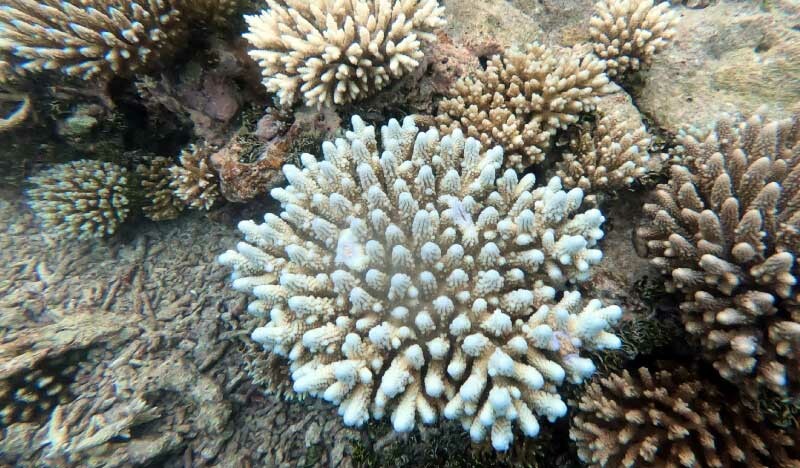Maldives Faces Looming Coral Bleaching Crisis: Expert Insights and Urgent Calls for Action

Photo: Nizam Ibrahim on X
The Maldives, renowned for its pristine coral reefs and vibrant marine life, is on the brink of a devastating coral bleaching crisis. Triggered by rising sea temperatures, this phenomenon threatens to decimate the nation’s invaluable marine ecosystems, prompting urgent warnings from experts and environmentalists.
Coral Bleaching: A Looming Threat
The U.S. National Oceanic and Atmospheric Administration (NOAA) and the International Coral Reef Initiative (ICRI) have sounded the alarm on a fourth global mass coral bleaching event. Incidents of coral bleaching were reported across reef systems in Australia, Brazil, and other countries. The announcement marks the fourth worldwide event and the second in the last decade, highlighting climate change’s escalating threat to coral reefs worldwide.
Coral bleaching, a natural phenomenon exacerbated by climate change, occurs when corals expel the colourful algae within their tissues, leaving them stark white and vulnerable. The Maldives experienced its first mass coral bleaching event in 1998, marking the beginning of a troubling trend of increasing frequency and severity.
The largest mass coral bleaching event recorded in the Maldives struck in 2016, leaving a staggering 73% of all corals impacted, according to a report by the Maldives Maritime Research Institute (MMRI). Despite eight years of resilience and recovery, the nation now faces the grim prospect of another intense bleaching event in 2024.
Expert Insights from Nazim Ibrahim
Speaking to MV+, marine biologist Nizam Ibrahim provided invaluable insights into the unfolding crisis. He confirmed that reefs in Huvadhu Atoll are experiencing coral bleaching, with signs of bleaching observed for the past three weeks.
Expressing deep concern, Nizam stated, “Compared to the 2016 mass bleaching event, (the current situation is) very severe as the warmest days are still ahead.”
4th MCBE in #Huvadhu,
#Coralbleaching is on full throttle in #Maldives. After 8 years of recovery from the 3rd Mass Coral Bleaching event, we’re facing the 4th Mass Coral Bleaching Event in just 8 years. The resilience of these reefs is being tested once again. pic.twitter.com/yoP9jcygQx— Nizam Ibrahim
(@nixams8) April 16, 2024
MMRI has also raised alarm about the phenomenon, noting that localised bleaching has been seen in various atolls across the Maldives. They have called for the public to report any signs of bleaching to https://coraldatabase.gov.mv/reporting.
We have noticed that localized bleaching has started in some places in the Maldives. The current NOAA forecast is looking dire over the next few weeks. If you are observing signs of bleaching in your reefs, please share with us via https://t.co/YXIllSZFtZ pic.twitter.com/nrF6CVIdMc— Maldives Marine Research Institute (@MMRI_Maldives) March 17, 2024
Factors Contributing to Coral Bleaching and the Subsequent Impact
Nizam identified human-induced global warming as the primary culprit: “It’s mainly warming of the oceans, mainly due to Human-induced global warming. It is a global phenomenon. I confirmed coral bleaching in Huvadhu, but this is likely happening nationwide. In Huvadhu, it was easy to identify (bleaching) due to (past) healthy coral cover observed from most of the reef locations.”
Warning of dire consequences, Nizam emphasised, “Loss of coral cover due to coral dying off will directly impact reef fisheries, as reef fish need healthy reefs to survive and thrive. Our pole and line fishery needs bait fish, which also needs healthy reefs, so no reef means no bait for the tuna fishery. This will not be immediate, but it will have a direct impact.”
The Path Ahead
Despite the daunting challenges ahead, Nizam remains cautiously optimistic about the prospects for recovery and long-term sustainability. Reflecting on past resilience, he remarked, “Huvadhu and reefs across the Maldives became reef graveyards after the 2016 mass coral bleaching event. Still, recovery was excellent after eight years. However, if frequent bleaching events occur, our reefs might lose the ability to return to favourable conditions.”










